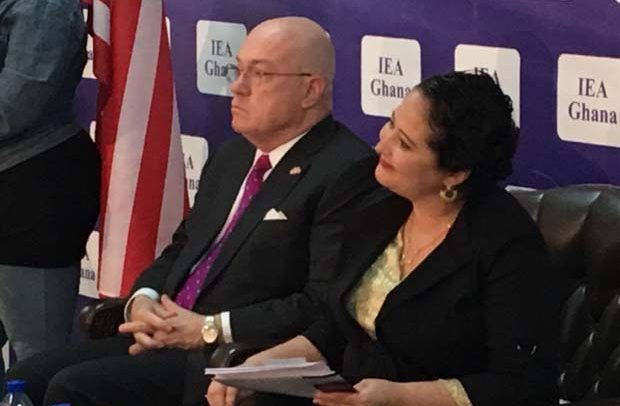Ambassador Jackson and Ms. Villegas seated at the forum chaired by Dr. Rose Mensah Kutin, Executive Director of Abantu for Development, a women’s right non-governmental organization.
OUTGOING US Ambassador to Ghana, Robert P. Jackson, has called for the development of Ghana’s mining sector in a manner that does not cause destruction to human lives and the environment.
Ambassador Jackson was speaking yesterday in Accra at a forum on illegal mining organized by the Institute of Economic Affairs (IEA) under the theme: “Towards Reforming and Restructuring Ghana’s Small-Scale Mining Sector: Lessons and Best Practices to Shape Policy Formulation”.
According to him, small-scale mining done the wrong way damages the health of Ghana’s people and its environment.
On the need to lift the ban on small-scale mining in the country, he noted that Ghana’s gold industry has the potential to spur economic development.
However, he observed that it also has the potential to do “grievous harm to Ghanaians.”
According to the ambassador, illegal mining known in the local parlance as “galamsey”, breeds lawlessness, and endangers investments.
He intimated that the US was hoping to see a prosperous Ghana, adding that we believe that it can be prosperous and protect its environment and citizens at the same time.
He noted that the development of the mining sector could be done without endangering lives and the environment.
Director of PACT, Cristina Maria Villegas, in a presentation offered some suggestions that government could put in place before lifting the ban on small-scale mining.
Key among the measures she suggested included providing environmental training program for players in the sector, establishing a registration regime for those considered to be illegal miners, forming a community monitoring system like it’s done in DR Congo.
She also observed the need for Ghana to do a lot with its legal framework on the environment and mining before lifting the ban.
In attendance were Sam Okudzeto, a member of the council of state, parliamentarians, members of the academia, media and other key policymakers.
BY Melvin Tarlue & Will Tierney


